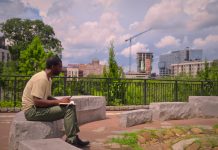
Screenshot via Vimeo
Any Atlanta garden enthusiast worth their weight in soil knows about Ryan Gainey. The world-famous eccentric master gardener designed the yards of Atlanta’s elite (including Anne Cox Chambers), once owned a beloved garden shop in Buckhead, opened his own flowering wonderland in Decatur for tours, and could be seen about town donning umissable colorful tunics, hats, and jewelry.
Gainey died in a house fire on his farm in Lexington in 2016, not long after filmmakers Steve Bransford and Cooper Sanchez completed shooting a documentary about his life. Shortly before his death, an enormous white oak, the soul of his Decatur garden, fell and crushed his house. Bransford, a video producer at Emory, and Sanchez, an artist and garden designer at Oakland Cemetery, spent six years collecting footage. The film, The Well-Placed Weed: The Bountiful Life of Ryan Gainey, premieres May 17 at the Plaza Theatre.
Gainey, who grew up in a working class family in South Carolina, was known to be a man of complexity. He could startle people with his generosity; others with his rudeness. He stole plants from people’s gardens when he didn’t think they appreciated them enough. He referred to plants only by their Latin names, with the express purpose of alienating those who didn’t understand. But he also gifted plants readily, and shared his abundant knowledge with anyone he deemed worthy.
In the film, friends and colleagues speak candidly. Gainey himself alternatively brushes away the camera and relishes it with humor. And of course, there’s the garden itself. The movie is punctuated with dreamy footage of his botanical bounty, spilling over with flowering plants. We spoke with Bransford on the eve of the premiere for more about the filming experience.
What was your first meeting with Gainey like?
He wanted to show me everything in his house. He wanted to show me these baskets, and all these paintings and books. And of course his press—he wanted to show me all these magazine articles. Some of it was his self-absorption, this kind of endlessly talking about himself, but there was also this relentless need to share things, share beautiful things, books, plants. We didn’t actually film that first time. Being the grad-school trained filmmaker, I thought, “I’m gonna leave the camera in the car and try to develop a relationship with this guy.” But I wish I’d brought my camera that first time—he revealed so much and it was really, really intense.
When do you feel like you got him to open up the most on camera?
There are two scenes. One, early on, was about how when he was growing up, his family stood up for integration. They were more progressive-minded, and they received some criticism for that. He talks about getting called out for that when he was at Clemson—he was called called a Jew-lover and a queer. That’s a powerful moment. He let that stuff just kind of roll off him, but it’s very intense. And then there’s a part later when he talks about the tree falling on his house, and we filmed that just a month before he died. There was this whole string of calamities that happened to Ryan in the final year of his life and we could only pack so much into the film. His very close gardening assistant—the one who puts on the peacock feather hat—passed away. And then there was the tree—but even before the tree, there was an incident where he got dragged down the street in his car—he left his car accidentally in neutral. It was dark time. We went to visit him in June 2016 and he was in kind of a rough spot. And that’s when we talked about the tree, and it kind of foreshadows what happened to him ultimately. He talked about the connection he had to the objects in his house, and I thought that was so poignant. Because all of these things have a story about where he got them or who he got them from, or he connected them to his family history or American history.
What was the most surprising thing you learned about him?
He had this rural persona that was a bit artificial. There’s an amazing line in the movie—“I don’t have a computer, but if I need to know something, I have someone look it up for me.” He wanted people to think he lived in this old cottage with this rural lifestyle. So some of it was constructed. But what I came to realize was he actually had very deep convictions that with the march of technology people were getting disconnected to the natural world and agrarian practices. So I think this persona helped him feel connected to that and stay rooted.
It seems like he could be difficult to work with. Did this pose challenges for you? Did he ever just shut you down?
[laughs] It was his show. We would have these ideas about the way we wanted to do something and—well, he has that line early on, “Can I just do it the way that I do it?” So in a lot of respects we tried to just get what we could get and filter it down. There really was no directing Ryan. But he was very engaging, and he was very funny. Usually these sessions would be about 90 minutes—that was about how long he could go—and then we would usually film a garden and get some B roll. But he was sweet with us, you know. I didn’t see a lot of the difficulty, but a lot of people who worked for Ryan did, and other friends did. I’ve heard so many stories. I mean, Lois Reitzes—we were on WABE, it was off the air, but she told us a Ryan story of him shutting her down because she mispronounced the name of a famous gardener. Everyone had a story. People were either like, “I saw his garden, it was amazing,” or “He was so unbelievably rude to me, I couldn’t believe it.”
What impressed you the most about his work?
Ryan had this way of making things look spontaneous even though they were planned. He would add these touches—like a well-placed weed—that you’d think were spontaneous, but they were very deliberate. There was a kind of amazing balance between things being free-flowing, and letting plants grow up where they wanted to grow up and things kind of spilling over, but also being very planned—there was a structure to the whole thing. It was a videographer’s dream to go over there and film. Sometimes I’d put a macro lens to a plant, sometimes I’d just walk around. Every time you went there you saw something new because plants were blooming all the time. There was something blooming 12 months a year, and there was also fragrance 12 months a year. So it always looked different and it always smelled different.
Had you completed the filming when he died?
We were wrapping things up, or trying to, in early 2016, before the tree. And then the tree happened, and we just kind of followed that, and then unfortunately was his passing. We don’t really dwell on the passing—it’s the intense ending in the film, but we don’t linger on it. All of these interviews were done while Ryan was living, so everything you heard people say they said while he was alive, which I think gave it a certain flavor. I think people maybe would have framed things a little differently if we’d done the filming after.
What did you have to leave out of the film that you wish you could have included?
So much stuff falls between the cracks. We’ve been posting a little bit of it on our Instagram, and we could be posting stuff until the end of time. A lot of stuff like the gardening techniques—we could post that endlessly. There are endless nuggets. I would have loved to do some drone shooting. Actually we did one—I got a friend from Emory to bring a drone over, and we crashed it into Ryan’s greenhouse and none of the footage came out. I was so worried Ryan was going to kill me. But he was like, “It’s fine, it happens all the time.” I said, “Drones crash into your greenhouse all the time?” and he said, “No, but people break the glass all the time.”
Did he get to see any of the film while he was alive?
We showed him, not the entire film, but parts of it in late 2015, or early 2016. He came over to my living room to watch, and he liked it. First of all, he wouldn’t shut up. He’d be talking through the whole thing . . . but he liked it. I think we showed him the scene of him making the prank phone calls, and he just turned to me and said, “This isn’t glamorous at all.”
The Well-Placed Weed premieres tonight at 7 p.m. at the Plaza Theatre. Tickets are $8.














